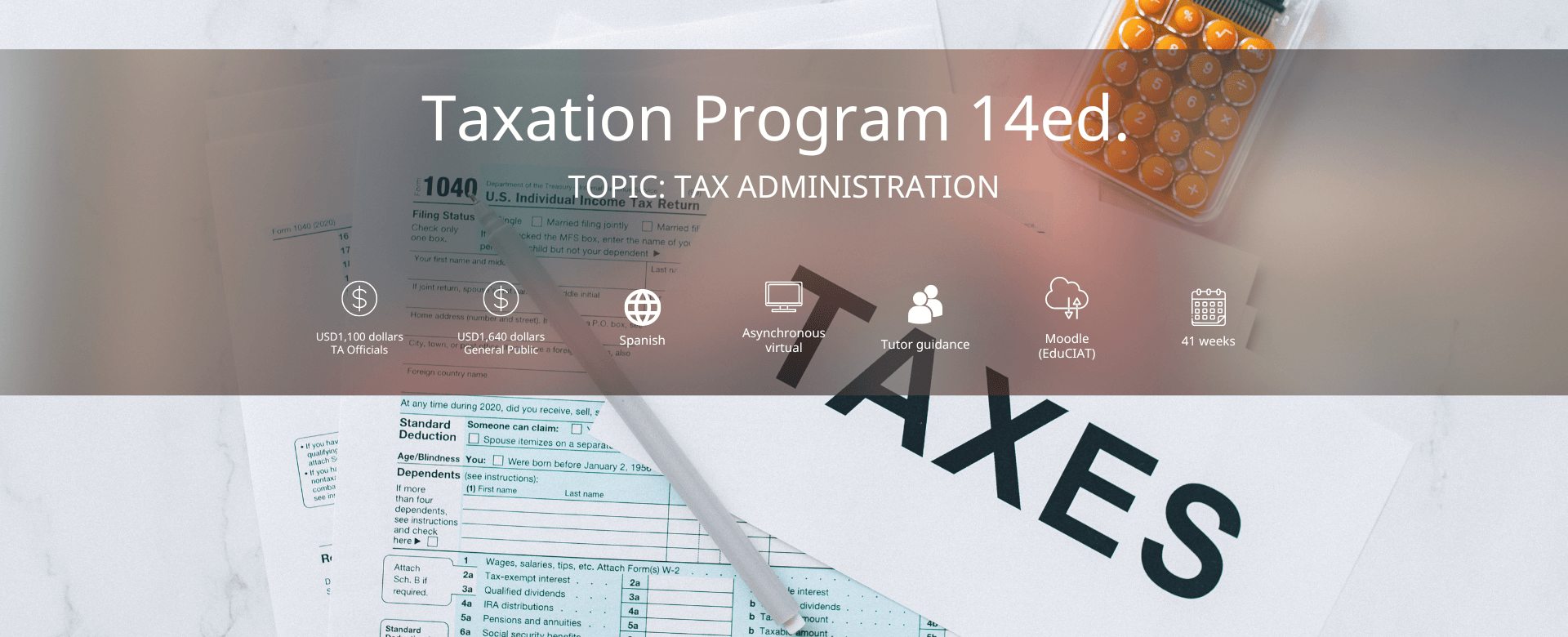
General Information
About the course
This course seeks to provide tax administration officials and the public in general of the countries of Latin America and the Caribbean, Europe and Africa, general knowledge on the most relevant taxation issues. The following topics will be developed during the course:
Module I
– Lesson 1. Tax Policy and the Basic Principles of Taxation
– Lesson 2. Basic Tax Concepts and structures
– Lesson 3. Models and Design of Tax Systems
– Lesson 4. Income Taxation
– Lesson 5. The Taxation of Business Earnings
– Lesson 6. Taxation of assets
– Lesson 7. Consumption Taxation
– Lesson 8. Taxation and levels of Government
Module II
– Lesson 1. Tax Law
– Lesson 2. The Taxes
– Lesson 3. Constitutional Tax Law
– Lesson 4. Material or Substantive Tax Law
– Lesson 5. Formal or Administrative Tax Law
– Lesson 6. Procedural Tax Law
– Lesson 7. Criminal Tax Law
– Lesson 8. International Tax Law
Module III
– Lesson 1. Introduction to International Taxation
– Lesson 2. Harmful Tax Practices
– Lesson 3. Transfer Pricing
– Lesson 4. Taxation of Electronic Commerce
– Lesson 5. Control of International Tax Planning
– Lesson 6. International Administrative Cooperation
Module IV
– Lesson 1. Conceptual Aspects of the Tax Administration and its scope of action
– Lesson 2. Conceptual Aspects of the Organizational Design: General aspects and Aspects of Organizational Structure
– Lesson 3. The Tax Administration Processes. The Substantive Processes: Collection and Taxpayer Assistance
– Lesson 4. The Tax Administration Processes. The Substantive Processes: Examination
– Lesson 5. The Tax Administration Processes. The Substantive Processes: Determination, Administrative appeals and collection
– Lesson 6. The Tax Administration Processes: The support processes
– Lesson 7. Human resources
– Lesson 8. Concepts of Planning and Control
Target audience
Tax administration officials and individuals of the CIAT member countries dealing with taxation issues.
Certification
The Training Coordination issues academic certificates of approval in digital format, which requires that participants have obtained the minimum passing grade of the course.
When
October 18, 2024 to September 28, 2025.
| Modules | Begin Date | Final Date |
| Module I | 18-oct.-24 | 16-feb.-25 |
| Module II | 24-feb.-25 | 11-may-25 |
| Module III | 19-may-25 | 13-jul.-25 |
| Module IV | 21-jul.-25 | 28-sept.-25 |
Registration Deadline
November 11, 2024.
Offer - Prepaid
Make payment by June 17, 2024 to get a discount:
- TA Officials: USD 880.00 (Regular Price USD 1,100.00)
- General Public: USD 1,300.00 (Regular Price USD 1,640.00)
Request it at mdonoso@ciat.org
Frequently Asked Questions
What are the technical requirements for the CIAT courses?
The participants will need the following tools:
- Internet connection.
- Updated browser (Google Chrome, Mozilla Firefox or Safari).
- Permissions to receive external e-mails.
- Adobe Reader.
- Java.
- Zoom, the tool for synchronous sessions.
How many hours should I dedicate to the course?
For the individual activities, you should dedicate at least one hour a day to review and complete the material. In the case of collaborative work, it varies from one to two hours for the correct development of the work that you have to do, together with your classmates. Generally, we calculate a weekly dedication of 12 to 15 hours. In general, the activities have a closing date on Sundays at 23:55 hours in Panama.
What is a virtual classroom?
The virtual classroom is the space where you will find the study materials, homework, discussion forums, exams and complementary material; in addition, you communicate with the tutor and classmates takes through the option of messages and communication forums. Through these means, you have the possibility to ask questions, resolve your concerns and academic doubts. The tutor will be present throughout your learning and teaching process.
In case of problems, who should I contact?
In order to better assist you and answer your questions, please contact the following:
- For computer assistance: César Trejos (ctrejos@ciat.org) and Maureen Perez (mperez@ciat.org)
- For administrative assistance: Mónica Donoso (mdonoso@ciat.org) and Maureen Perez (mperez@ciat.org)
- For academic assistance: Your tutor (through the platform).
The virtual classroom is equipped with several communication tools to share ideas and information.
What are the steps to withdraw from the course?
Within the first 10 days students must write a message to the Tutor with copy to the Administration with their intention to postpone it; demonstrating that it is due to justified situations of force majeure. The withdrawn student will be entitled to the amount of the payment made and may use it to enroll in the next edition of the training program. He or she will start again from the first lesson.

Alejandro Juarez
ajuarez@ciat.org
Maureen Pérez Álvarez
mperez@ciat.org
César Trejos Canto
ctrejos@ciat.org
Mónica Donoso
mdonoso@ciat.org
More about CIAT
-
Revenue Report CIAT (RRC). First Semester – year 2025
-
Fernando Raúl Martín
-
CIAT and SEFAZ-AL Strengthen Tax Modernization in Brazil with the Advancement of the SATI Project
-
Artificial Intelligence and Taxpayers’ Rights: regulatory consolidation in the Province of Córdoba
-
CIAT visited SIN in Bolivia
-
Reimagining Tax Administration in the Digital Age
-
Natalia Quiñones Cruz
-
New CIAT Publication on Anti-Avoidance Rules in Latin America
-
Esteban J. Alonso
-
Rosa Elena Orna Salazar
